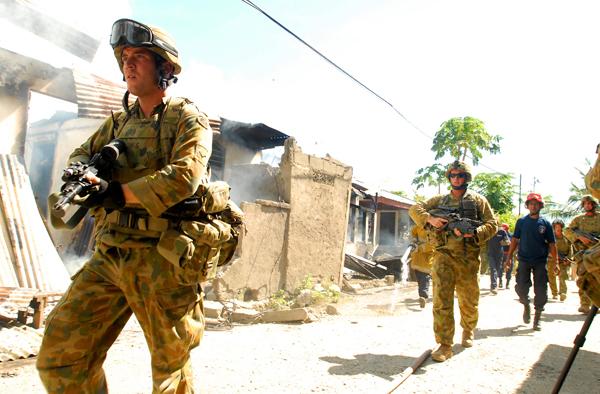A G20 power ‘down under’: getting the balance right
Posted By John Blaxland on November 13, 2014 @ 06:00
 [1]
[1]The debate about Australia’s place in the global geostrategic equation, as reflected in the different posts of Peter Jennings [2], Andrew Carr [3] and Rod Lyon [4], is a fascinating and important one. Peter and Rod are right that Australia has a vested interest in a rules-based global order and that interest sometimes demands military contributions beyond Australia’s immediate neighbourhood. My sense though is that the criticism levelled at Andrew’s stance misses the point.
Most readers of The Strategist, I presume, understand the significance of Australia playing a prominent role as a good international citizen. Indeed, Australian defence white papers (DWPs) have repeatedly made clear that—to paraphrase—Australia’s primary responsibility is to protect itself, then its neighbourhood and finally, where possible, contribute to global coalitions further afield.
Australian prime ministers have tended to have a clear understanding of what that meant. Malcolm Fraser saw it allowing a niche engineer contribution to a UN force in Namibia. Bob Hawke followed through on Fraser’s plans for Namibia when the Cold War thawed in 1989. Paul Keating and his Defence Minister, Kim Beazley, responded to calls for intervention in Somalia and Rwanda. As Foreign Minister, Gareth Evans led the charge in seeking a peace agreement to break the impasse in Cambodia in 1993. But those interventions all took place when Australia’s neighbourhood was remarkably stable.
Thereafter John Howard endorsed Australia’s intervention in the late 1990s and beyond alongside New Zealand in Bougainville, Solomon Islands and East Timor. In each case Australia’s contribution was well defined with a clear end-state in mind. Interestingly, the closer to Australia’s shores, the more resources and attention were devoted to making a meaningful contribution. Further afield, Australian governments, since the Suez crisis of 1956 if not before, have tended to be more circumspect.
Even in Afghanistan in 2001 and Iraq in 2003, when the imperatives to contribute to the so-called Global War on Terror were at a height, Howard sought to demarcate tightly the size, scope and time-frame of Australia’s military contributions, conscious of the need to keep his powder dry for the ‘arc of instability’, as the neighbourhood was sometimes described.
Only reluctantly did the government agree to return to Afghanistan and Iraq and then, once again, with a tightly-defined mandate, in support of its main ally, and with a clear and identifiable end-state. Contributions there were focused primarily on alliance management and secondly on global security. Making a meaningful contribution locally also gradually increased in importance as vindication, at least, for the sacrifice of those who died or were injured pursuing those objectives.
Even then, Australian policymakers found themselves so distracted by the Middle East they missed the brewing troubles in East Timor that precipitated another military intervention there in May 2006. A force was cobbled together and sent, but with little idea initially as to what the problem was or how it could be resolved. Ever since 1942, events in our region have tended to flare up while we’ve been preoccupied with second- or third-tier priorities (using DWP metrics as a guide) in places like the Middle East.
Australians subsequently left Iraq and scaled back markedly in Afghanistan, only to be dragged back in to assist in Iraq—and this time into an even murkier set of circumstances. Today the coalition is dealing with a strange set of bed-fellows. Its so-called strategy is little more than an operational plan. And in the absence of a grand bargain between Saudi Arabia and Iran over how to split the spoils between the Shia and Sunni worlds in and around Iraq, Australia and the coalition are spending enormous financial and material resources to strike at one head of a regional hydra—that is, the latest manifestation of militant jihadist Islamism.
Today the Global War on Terror looks tired—and devoid of good ideas about how to make a meaningful contribution to the long-term future of the Middle East. It’s not even clear why the West feels the need to lead the charge again, particularly when the adjoining states have a greater vested interest in resolving the crises and when the drain on US resources leaves it vulnerable elsewhere.
In the meantime, the geostrategic equation in East Asia has changed markedly. The rise of China and the competition between the great powers of Asia—including Russia, Japan and India—point to pressing concerns closer to Australia that should be, more than ever, the focus of attention. It’s in the closer parts of the Indo-Pacific region that Australia has traditionally been able to make a meaningful contribution to security and stability. It’s in this region that Australia’s Defence Cooperation Plan has focused its investment in resources and relationships for generations.
Yet today’s ADF is staffed by people with little knowledge of or experience in the region. Critics might say we can walk and chew gum—participate in an open-ended war in Iraq and be prepared for contingencies closer to home—while keeping up the growing regional defence engagement priorities. The jury’s out on that. Experience in May 2006, let alone 1942, suggests we shouldn’t be so cocky about reaching too far beyond our neighbourhood.
John Blaxland is a senior fellow at the Strategic and Defence Studies Centre at ANU. Image courtesy of Department of Defence [5].
Article printed from The Strategist: https://aspistrategist.ru
URL to article: /a-g20-power-down-under-getting-the-balance-right/
URLs in this post:
[1] Image: https://aspistrategist.ru/wp-content/uploads/2014/11/20060604adf8161479_235_lo.jpeg
[2] Peter Jennings: https://aspistrategist.ru/being-a-top-20-defence-player/
[3] Andrew Carr: https://aspistrategist.ru/learning-to-act-like-a-major-power-australia-as-a-top-20-nation/
[4] Rod Lyon: https://aspistrategist.ru/near-or-far-the-choices-of-a-top-20-defence-nation/
[5] Department of Defence: http://www.defence.gov.au/opEx/global/opastute/images/gallery/20060605/20060604adf8161479_235_lo.jpg
Click here to print.